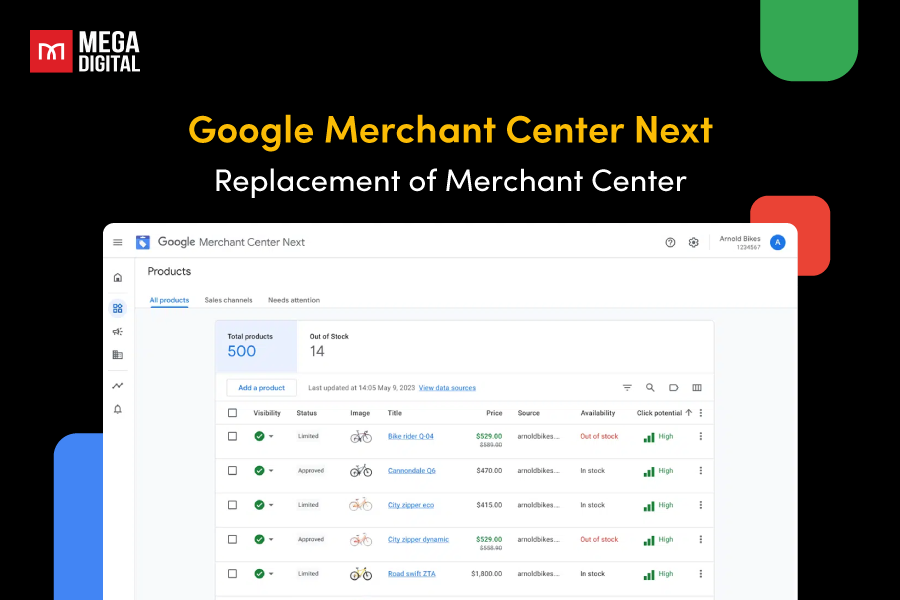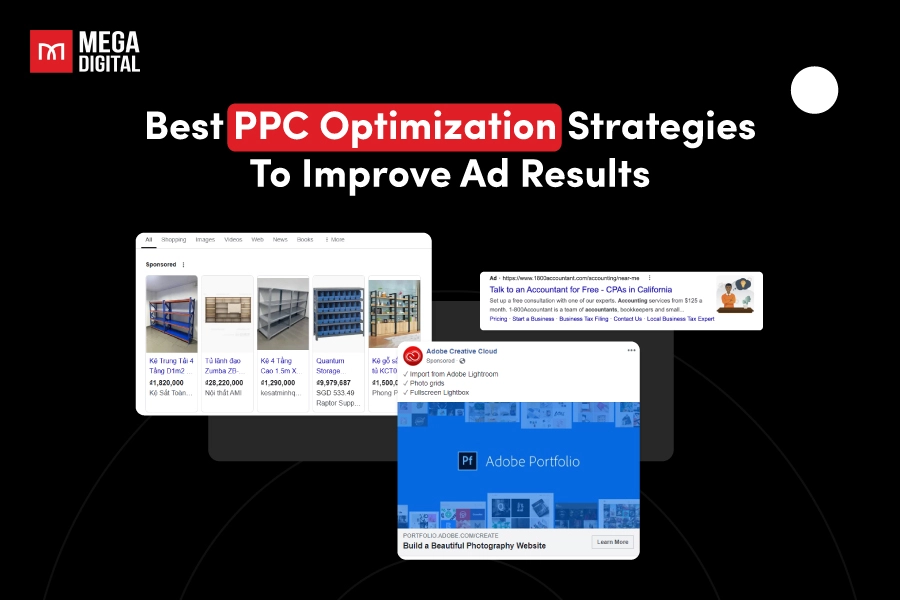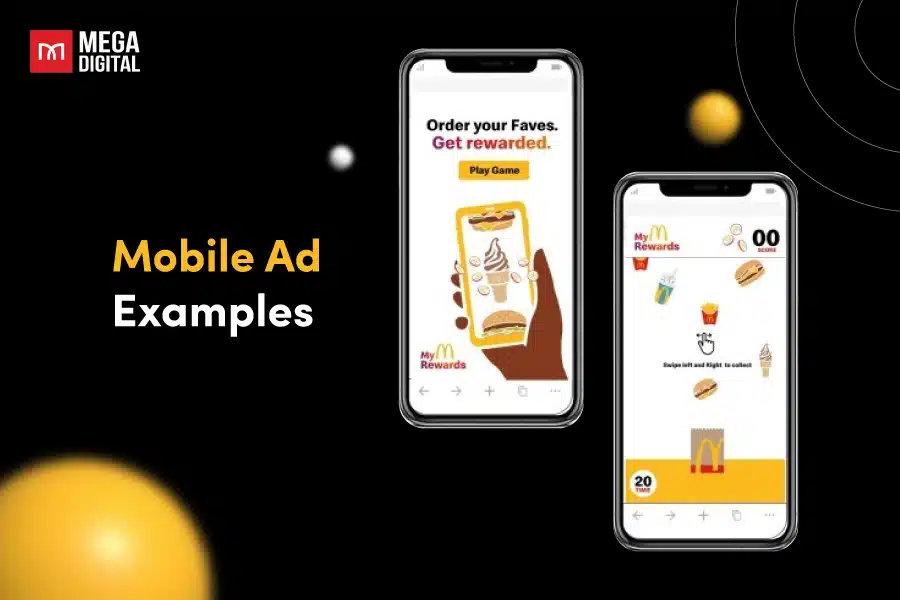Choosing between SEO vs PPC is a crucial decision for any business. While SEO focuses on long-term organic growth, PPC offers immediate results with paid ads. Understanding their differences can help you decide which strategy works best with your business goals. In this article, I will break down the key elements of these 2 advertising methods to help you determine which one is better for your business.
SEO Overview
SEO can seem like a complex concept, but once you break it down, it’s essentially about making sure your website gets noticed by search engines like Google. So, let’s have a quick look at what it is!

Definition
SEO (Search Engine Optimization) is the process of optimizing a website or online content to improve its visibility on search engine results pages (SERPs). By using a combination of techniques like keyword optimization, link building, and improving user experience, SEO aims to attract organic traffic to a site from search engines like Google, Bing, or Yahoo.
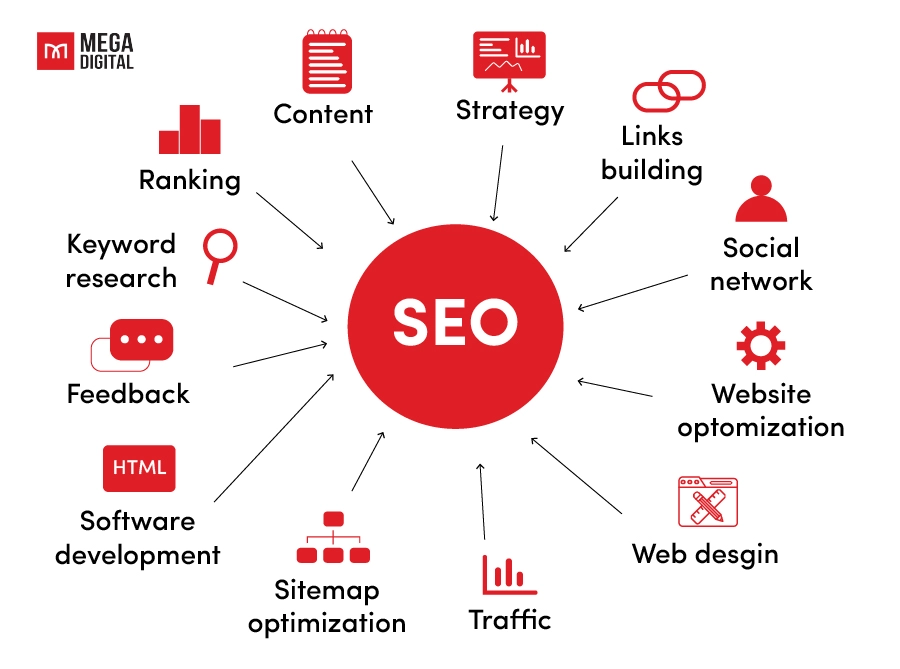
Benefits
Now, why should you care about SEO? Well, let’s dive into some key benefits.
- Increased website traffic: The higher the rank in Google, more is the traffic since the majority are always found on the first page.
- Cost-effective marketing: SEO approach will create visibility that is permanent thus no need to pay regularly for placement like in the adverts.
- Improved usability: Search engine optimization is geared towards improving the user experience too, with enhancement features such as reduction of loading time and more accommodating designs.
- Boosted brand credibility: Growing trust towards the brand: drawing the attention of potential customers by using search engine optimization will result in trustworthiness and positivity in their products and services.
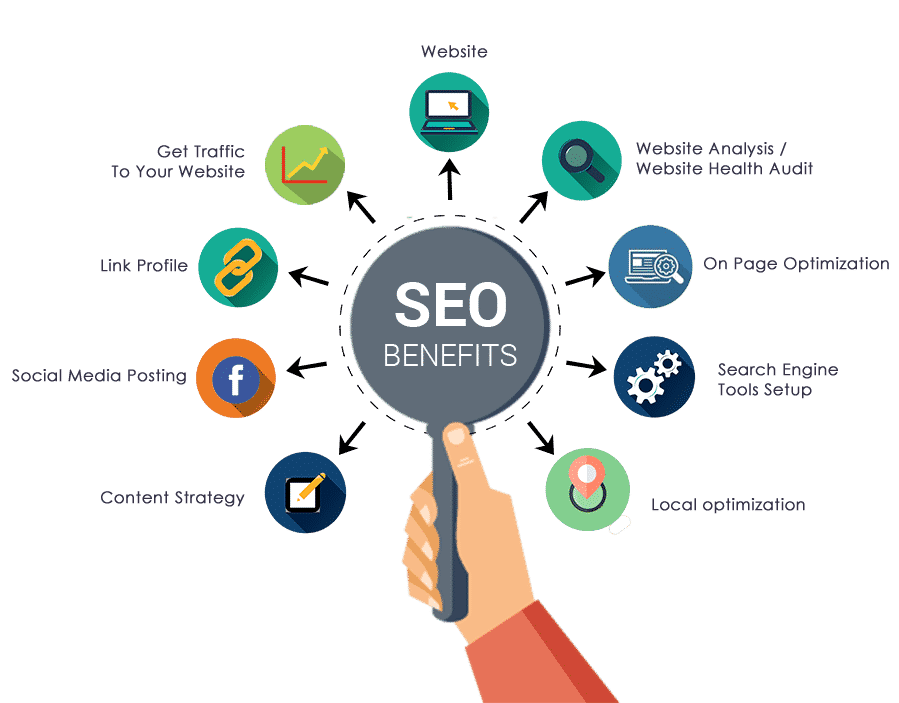
When to Use
If you’re looking to build a solid foundation for your business and want long-term growth, SEO is definitely the way to go. It’s ideal for businesses that are okay with taking a slower, more organic approach to reaching new customers.
Plus, SEO is a cost-effective option since it focuses on organic search rather than paid advertising.
All you need to keep in mind is that SEO takes time to see results, but once you start ranking, the benefits stick around without the need for continuous spending.
So, while there’s some upfront work involved, the long-term payoff is huge, especially for businesses on a budget.
Let’s say you run an online furniture store that sells custom-made pieces.
You’re looking to establish a long-term presence and want to make sure that people find your website when they search for things like “handmade wooden dining tables” or “modern minimalist furniture.” SEO is perfect for this situation.
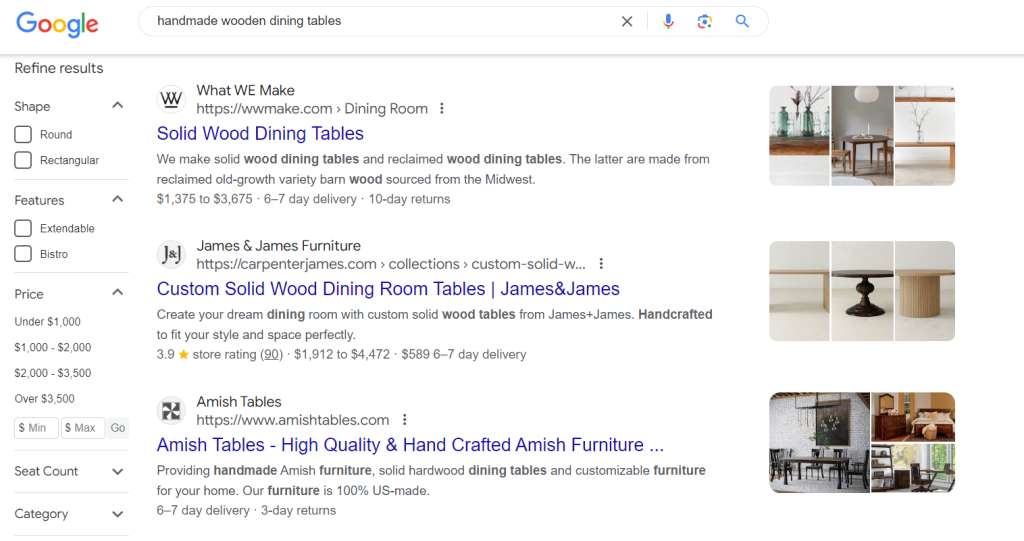
By investing time in optimizing your product pages, creating blog content that showcases your expertise, and getting backlinks from reputable sites, you’ll steadily rise in the rankings.
Over time, when someone searches for custom furniture, they’ll see your business on the first page of Google, which will keep driving traffic to your site without any additional advertising spend.
Sure, it might take a few months to see results, but once you do, that traffic is essentially free and keeps coming in, helping you build a strong brand reputation.
PPC Overview
Now let’s move to PPC. In this part, I will share with you all the basic information about this advertising platform, including its definition, benefits, and when you can use it for your campaign.
Definition
PPC (Pay-Per-Click) advertising is exactly what it sounds like – you pay each time someone clicks on your ad. It’s more of a short-term game where you can get instant results and control how much you spend.
With PPC advertising, your page can appear at the very top of search results, giving you prime visibility right away. This means you’re getting your product or service in front of potential customers quickly, without waiting to climb up the rankings like you would with SEO.
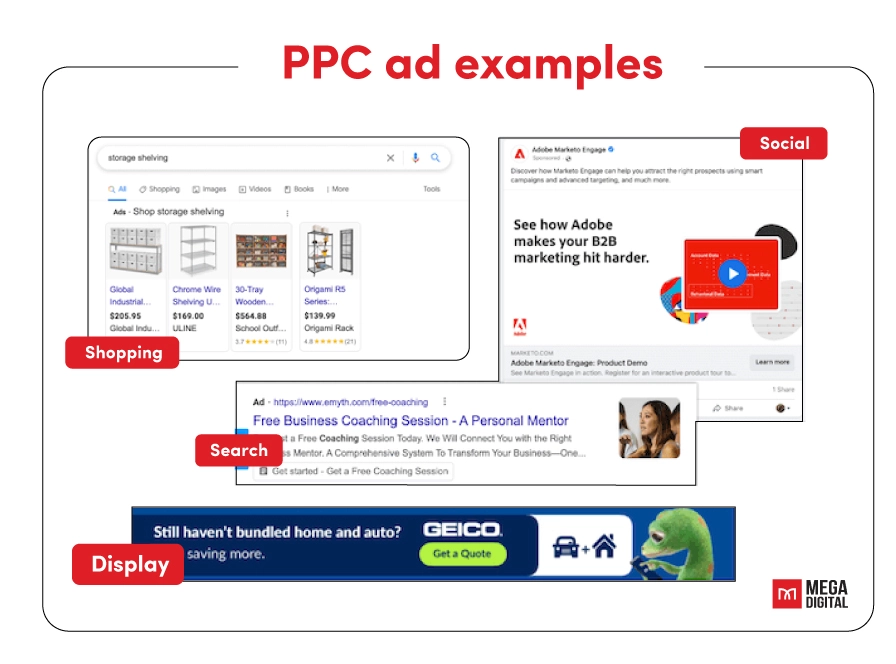
Benefits
Here are some compelling reasons to consider PPC:
- Immediate Results: Unlike SEO, which takes time to build rate, PPC campaigns can drive traffic almost instantly. Once your ad is live, you can start seeing visitors within hours.
- Targeted Advertising: PPC allows you to target specific demographics, interests, and locations, ensuring your ads reach the right audience, which can help lead to higher conversion rates.
- Budget Control: You can set your budget and adjust it at any time. This flexibility enables you to manage costs effectively, scaling your spending based on your campaign performance.
- Measurable Results: PPC provides detailed analytics, allowing you to track conversions, click-through rates, and overall performance to refine your strategy and maximize your return on investment.
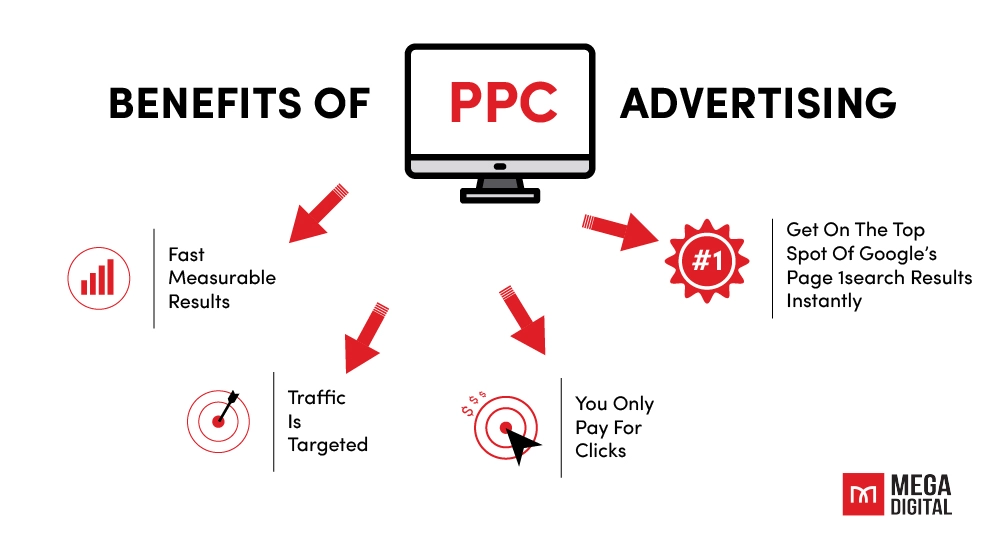
When to Use
You can consider investing in PPC if you need quick visibility and traffic, want to promote specific products or services, or are running time-sensitive campaigns. It’s especially beneficial for businesses in competitive markets where organic rankings might be challenging to achieve quickly.
Now, let’s imagine it’s the holiday season, and you want to quickly promote a new line of limited-edition chairs that would make the perfect Christmas gift. You don’t have time to wait for SEO to kick in, so you turn to PPC.
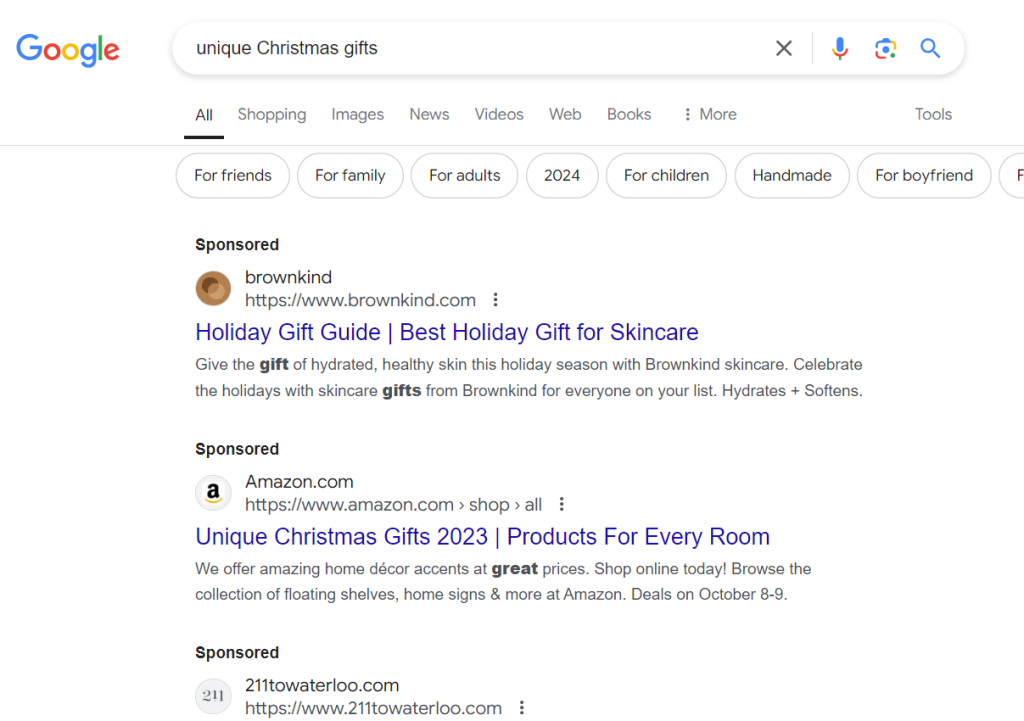
To start, you can create a targeted ad campaign, focusing on shoppers who are searching for terms like “unique Christmas gifts” or “luxury home decor.”
Then, within hours of launching your ads, potential customers start clicking through to your site. Because PPC allows you to control your budget, you can scale up or down based on how well the ads are performing.
Plus, you’re able to track how many of those clicks are turning into purchases, which gives you valuable data for future campaigns. PPC ensures that your limited-time offers get noticed right when you need them most.
>>> Read more: 13 Best Pay-Per-Click Strategies that Maximize Your ROAS
The Key Differences Between SEO and PPC
Choosing between SEO and PPC is a crucial decision for any business looking to grow its online presence. In this part, I will make a comparison that breaks down the 5 key differences between SEO and PPC.
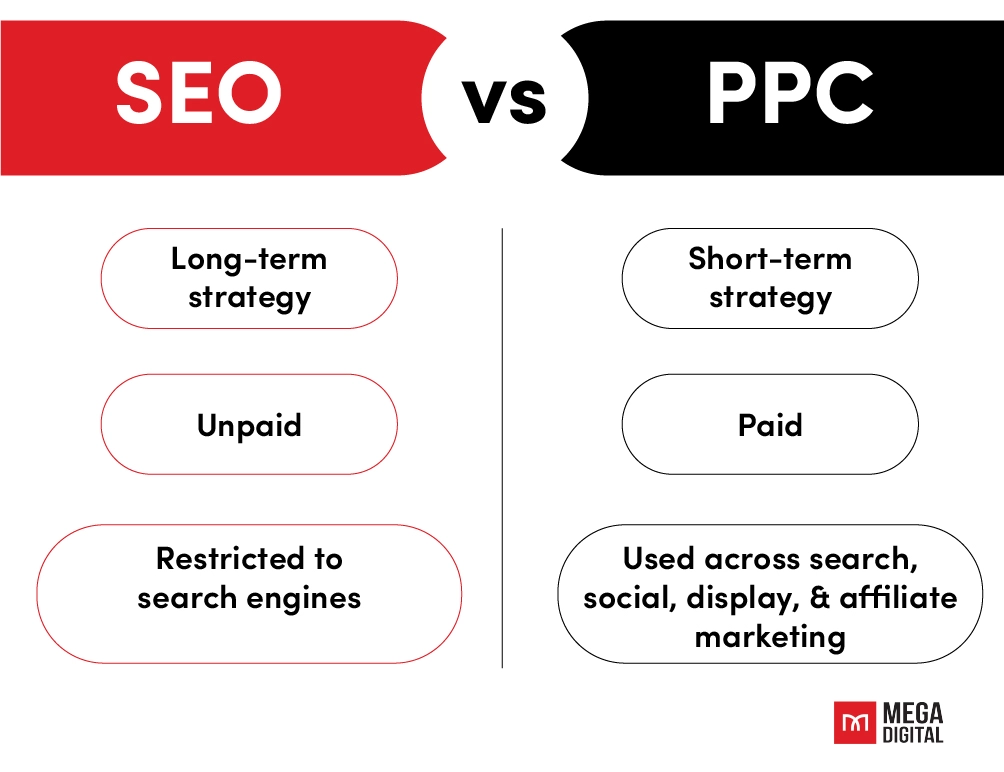
#1 Cost
When deciding between SEO and PPC, one of the first factors to consider is the cost. Both have financial implications, but they operate differently in terms of budget and long-term returns.
SEO
SEO is often considered a long-term investment. Once you’ve climbed the rankings, the standout of SEO is that you don’t have to pay anything for clicks.
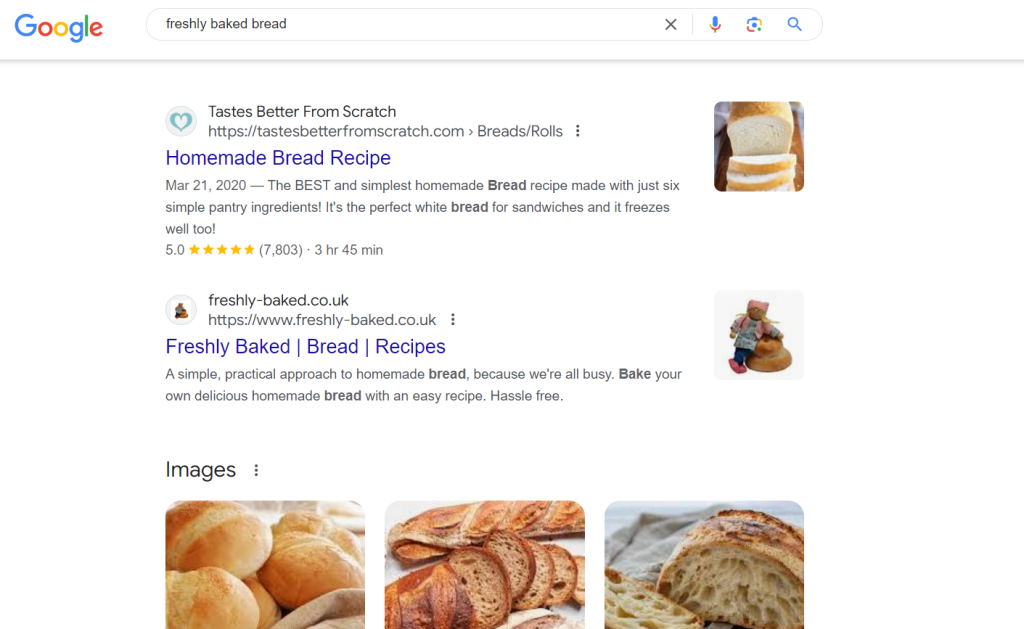
For instance, imagine a local bakery investing time in optimizing its website for the keyword “freshly baked bread.” and optimizing content regularly as well as adding content with relevant keywords such as “easy homemade cakes” and “best cake decorating tips.”
Their site gradually gained more organic traffic. Over time, they ranked top spot on Google’s first page for those keywords, driving consistent free traffic. Now, they benefit from steady visitors without paying for ads, proving that SEO can deliver big returns if you stick with it.
PPC
On the flip side, PPC operates on a pay-per-click model, which can lead to accumulating costs quite rapidly.
PPC costs can vary widely depending on factors like industry, competition, and the specific keywords you’re targeting. In less competitive industries, you might pay as little as $1 to $2 per click, but in highly competitive fields like legal services, finance, or health, costs can soar to $50 or more per click.
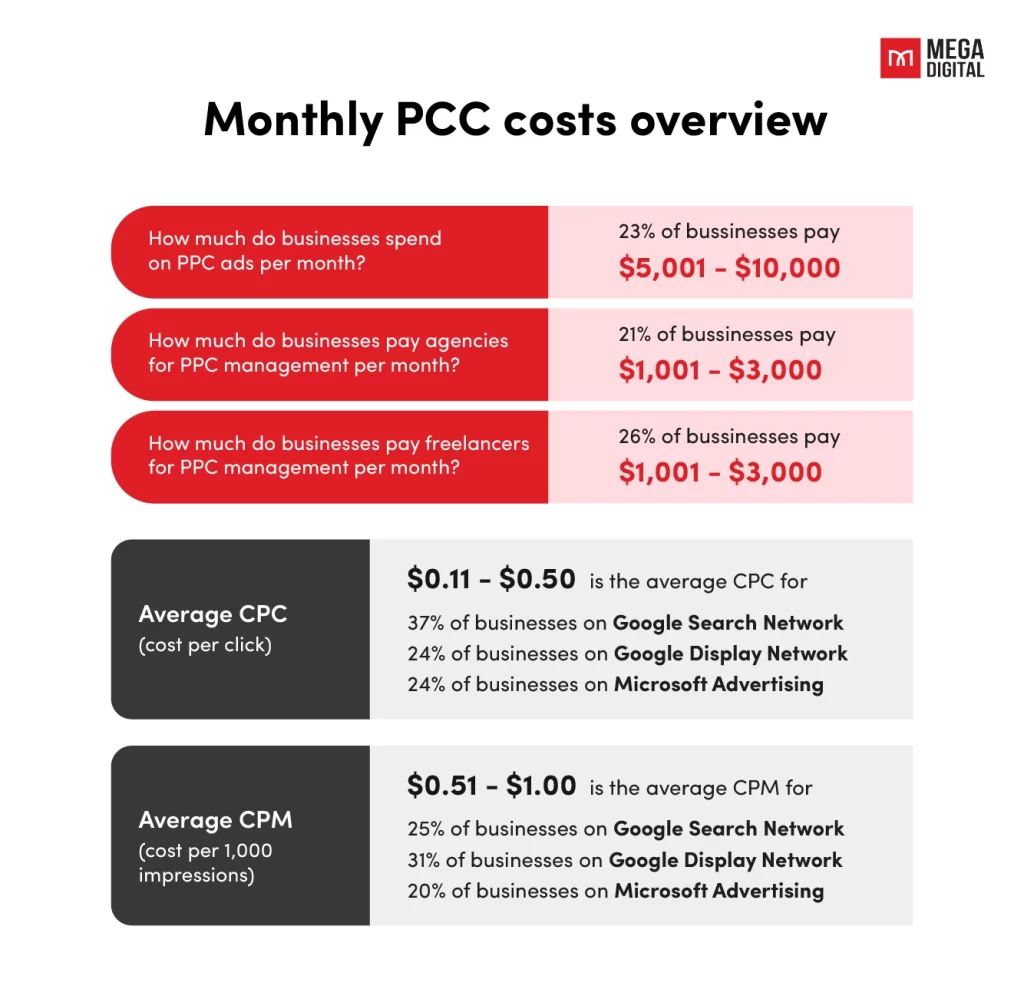
Continuing with our bakery example, if they decided to run a Google Ads campaign targeting “best bread in Los Angeles,” they might pay around $3 for each click. If the ad attracts 100 clicks in a month, that totals a hefty $300.
Your costs also depend on your targeting settings, ad quality, and bidding strategy, which can influence how much you end up paying for each visitor.
Conclusion
In terms of cost, SEO often proves to be more budget-friendly in the long run, while PPC can be more expensive, especially in competitive markets. Therefore, if you’re looking for sustainable, ongoing traffic with lower long-term costs, SEO is generally the better choice.
#2 Time Frame
Another major difference between SEO and PPC is the time it takes to see results. Both can bring traffic, but their timelines are vastly different.
SEO
SEO is not a quick fix; it takes time and consistent effort to see results. It can take anywhere from 3 to 6 months to start seeing noticeable improvements in rankings.
In competitive niches like finance, real estate, or legal services, the SEO timeline can stretch even longer since these industries often have numerous well-established websites vying for the same top search positions.
It can take 12 months or more to see improvements, as you’re not only optimizing your site but also competing against websites with strong authority and extensive content. This lengthy time frame can be a drawback for businesses needing immediate results.
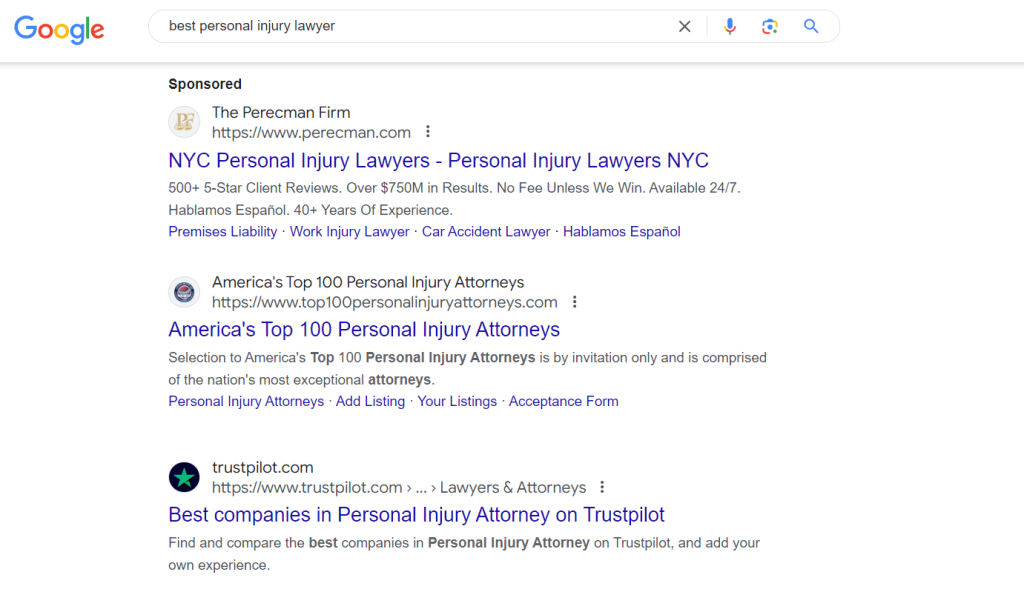
For example, a law firm trying to rank for “best personal injury lawyer” might have to spend over a year creating detailed legal guides, building backlinks from authoritative sites, and fine-tuning their local SEO efforts.
During this time, they’re competing with other firms that have likely been working on their SEO strategies for years, making it difficult to achieve quick results.
PPC
In contrast, PPC allows for immediate visibility, making it a powerful tool for businesses seeking quick results. Unlike SEO, where it can take months to see significant traffic growth, PPC campaigns can start driving traffic within hours of launching. Once your ads are live, you can instantly attract clicks and visitors, allowing you to gauge the effectiveness of your campaign right away.
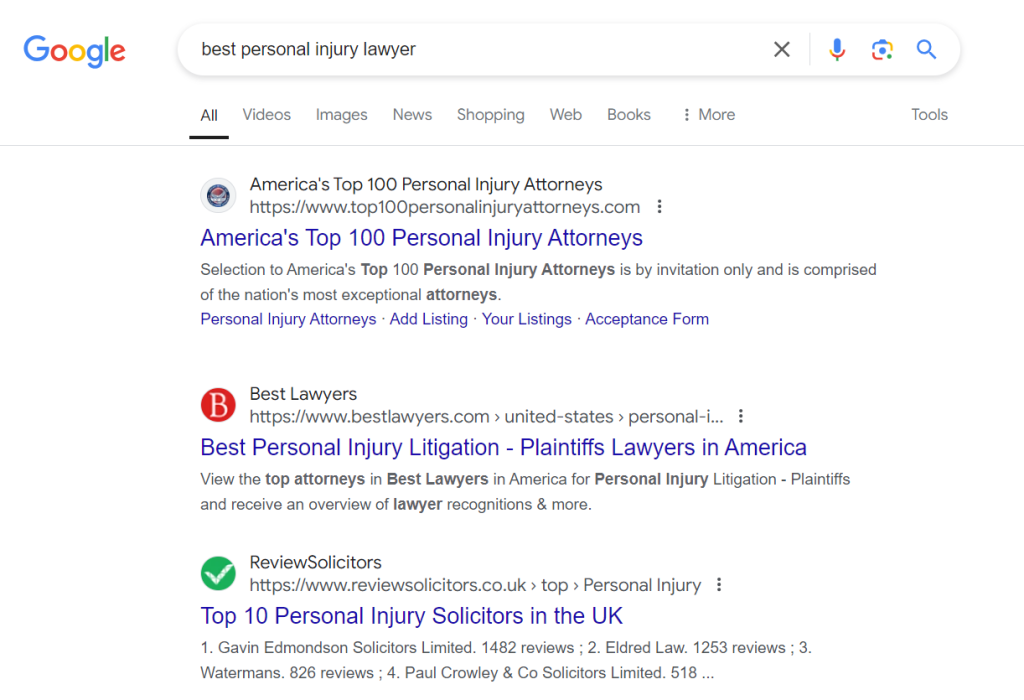
For example, the same law firm trying to rank for “best personal injury lawyer” could run a Google Ads campaign. As soon as the ad goes live, they can start attracting potential clients immediately, possibly generating 50 to 100 clicks within the first few days, depending on the competitiveness of the keywords rather than waiting a year for SEO efforts to pay off.
Conclusion
If immediate results are crucial for your business, PPC is the superior choice as it delivers instant visibility. However, if you can invest time in a more sustainable, long-term strategy, SEO may be more beneficial.
#3 Positioning
Now, let’s explore how each method impacts where your site appears on a search engine results page.
SEO
SEO focuses on earning organic rankings, which typically appear below-paid ads on search engine results pages (SERPs).
This can be both a pro and a con: while organic traffic is free and often viewed as more credible, it can also result in lower visibility if competitors dominate the paid ad space.
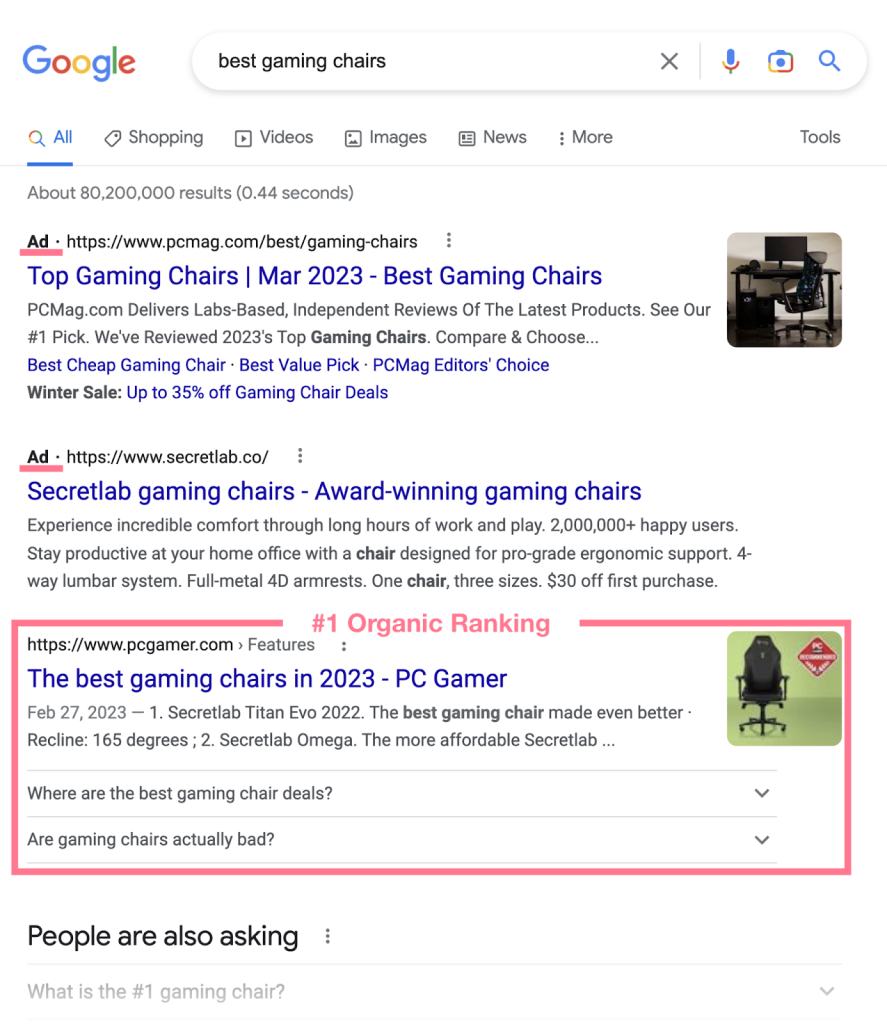
For example, PC Gamer, a company specializing in high-end noise-canceling headphones, invests in SEO by optimizing for “best gaming chairs” with detailed product reviews and improved site usability. After months of effort, they achieve a first-page ranking.
However, when users search for “best gaming chairs,” they often see paid ads from competitors like PCMAG and Secretlab at the top. Despite PC Gamer’s informative content, their organic listing is lower, impacting visibility significantly; nearly 70% of users click on the top results. Consequently, SoundTech risks losing potential customers to those prominent paid ads.
PPC
On the other hand, PPC offers a different kind of visibility through strategic ad positioning. When businesses invest in PPC, they can secure top spots on search engine results pages almost instantly.
This prime placement means their ads appear above organic listings, increasing the chances of attracting clicks.
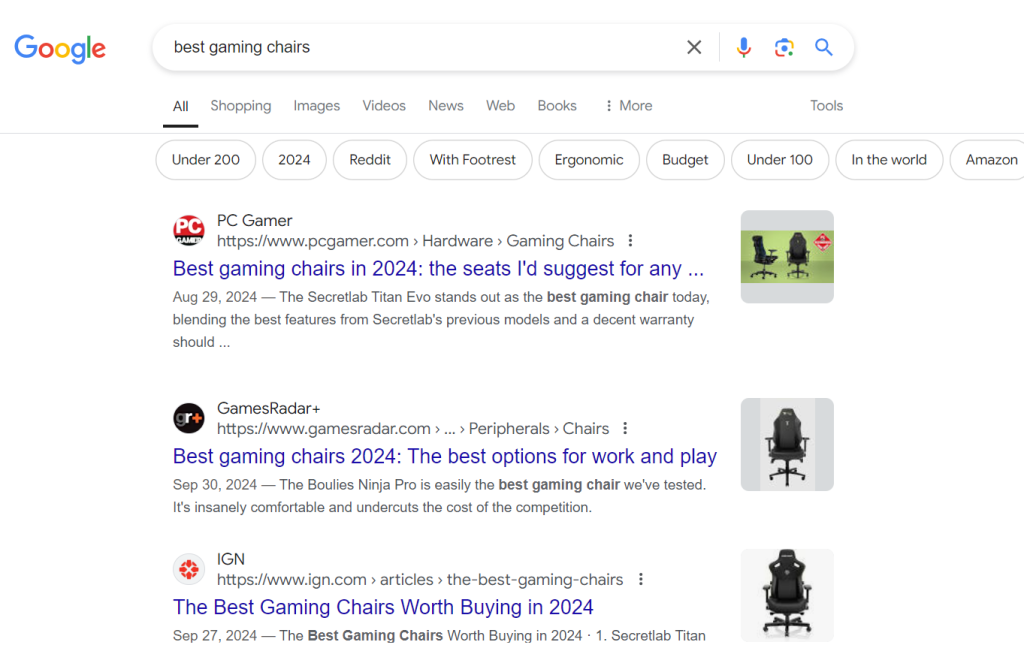
If PC Gamer decides to invest in a Google Ads campaign for “best gaming chairs,” they can secure a top position instantly.
By paying for this ad space, their ad will appear at the very top of the search results page, directly above the organic listings, which can increase the likelihood of clicks, leading to a higher immediate traffic influx, regardless of their organic ranking.
Conclusion
For positioning, PPC is advantageous for securing immediate visibility, whereas SEO can offer long-term organic positioning, albeit at a potential cost to visibility if paid ads dominate. Therefore, if you’re prioritizing instant visibility, PPC is better, but for sustained credibility, SEO shines.
#4 Sustainability
The sustainability of your traffic and visibility is a key difference between SEO and PPC, impacting long-term planning and marketing strategies. Here’s how it differ between SEO vs PPC:
SEO
SEO can provide lasting benefits, as organic rankings often endure over time.
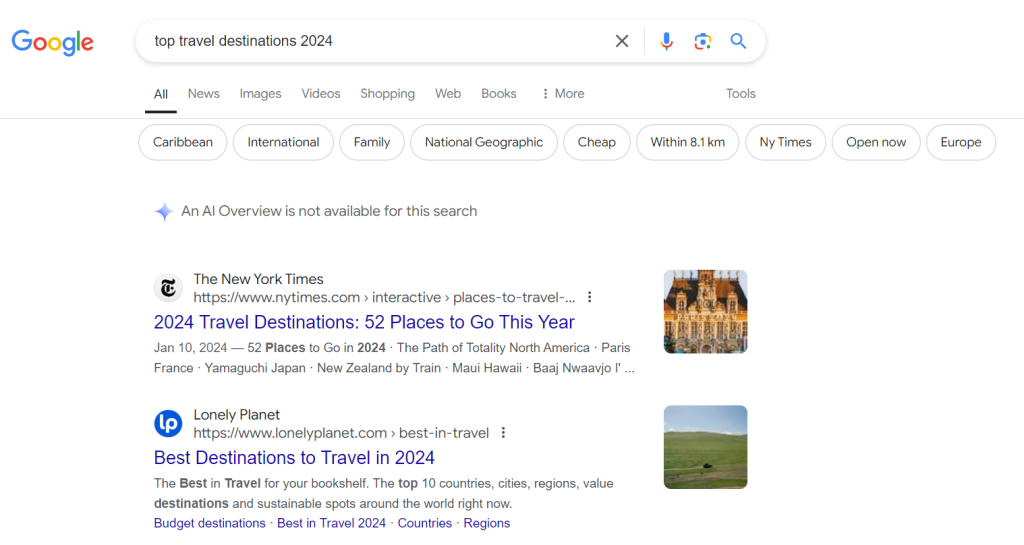
For instance, a travel blog that ranks well for “top travel destinations 2024” can continue to attract visitors without incurring extra costs, provided they regularly update their content of the top destinations annually and maintain SEO best practices.
PPC
Meanwhile, PPC lacks the same sustainability since once the budget runs out, the traffic stops immediately.
Let’s say your travel blog invests in a Google Ads campaign for “best travel deals,” they’ll only receive visibility as long as you fund the ads. Once you stop paying, your presence in search results disappears.
Conclusion
In summary, SEO typically offers greater sustainability for long-term traffic, while PPC provides temporary visibility contingent upon funding. Therefore, for ongoing presence and traffic, SEO is the preferable option.
#5 Trust
Lastly, trust is a significant factor when comparing SEO and PPC. Understanding how your audience perceives your presence on search engine results pages (SERPs) can dramatically impact the success of your digital strategy.
SEO
SEO tends to foster trust over time since organic search results are often viewed as more credible by users.
When a website consistently delivers high-quality content and user-friendly experiences, it establishes authority in its niche. As a result, search engines like Google recognize this effort, promoting those sites in their rankings, which reinforces users’ belief that the top results are reliable.
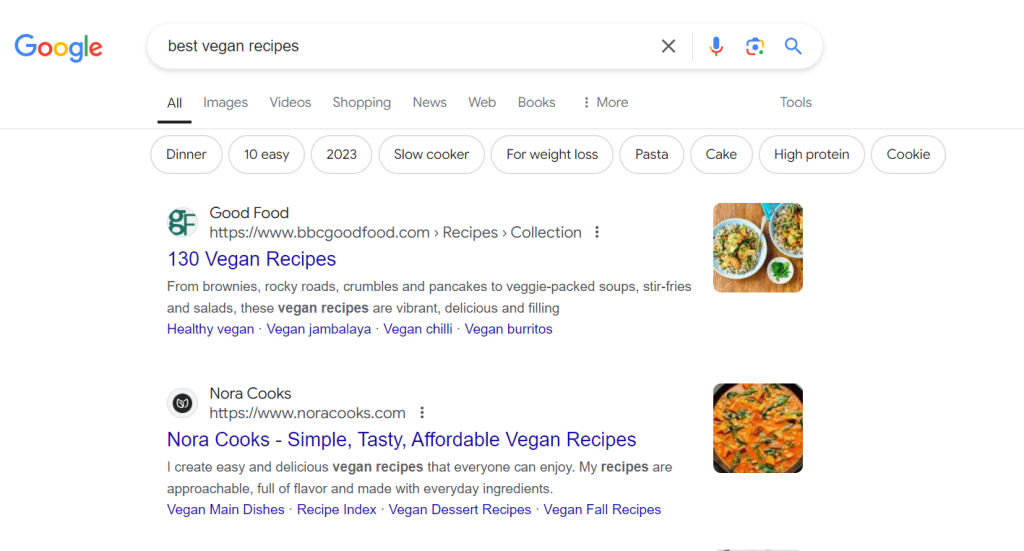
For example, when someone searches for “best vegan recipes” and finds a top-ranking blog like Minimalist Baker, they are more likely to trust that resource, believing it has earned its position through quality content and expertise.
This trust isn’t just good for credibility; it can lead to more engagement and even sales since when users feel confident in the information they find, they’re more likely to return, which is essential for building a strong online presence.
PPC
Conversely, PPC ads can sometimes face skepticism from users. Many people recognize that a listing marked as “sponsored” means the business paid for that spot, which can lead to doubts about its credibility.
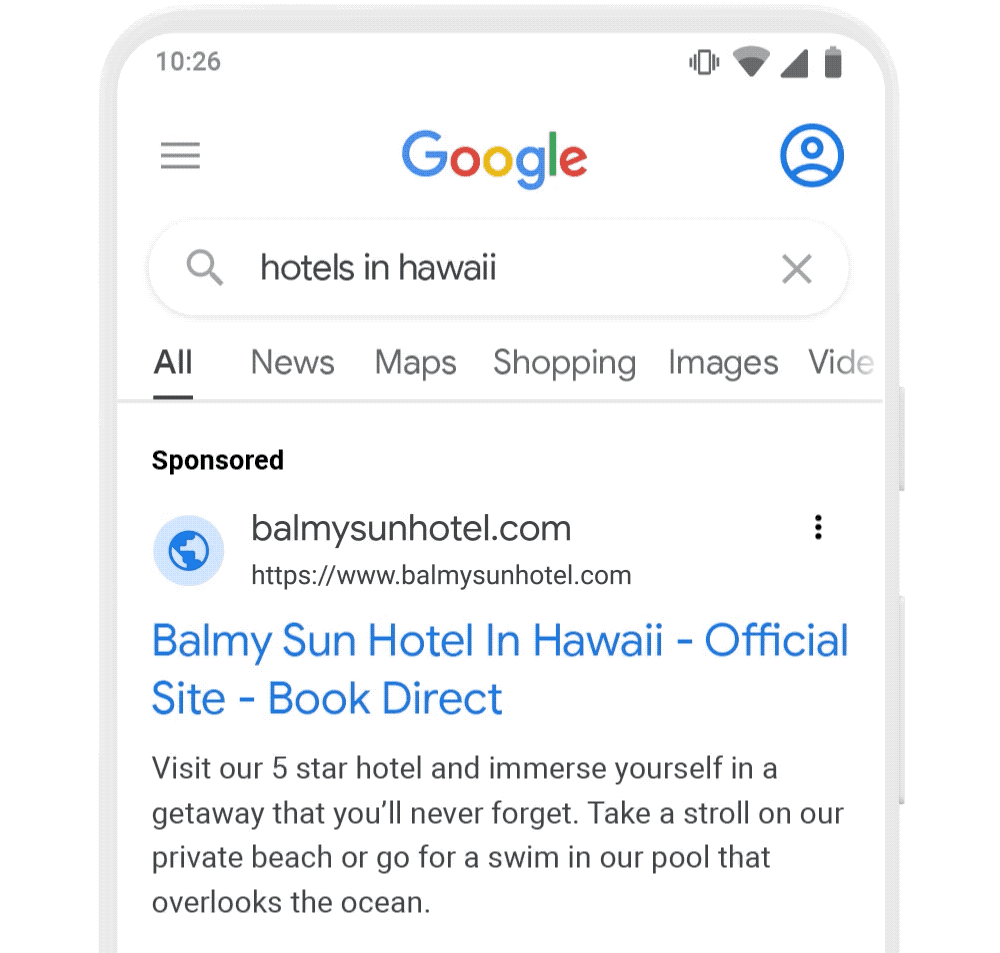
For example, when users search for “hotels in Hawaii,” they might see sponsored listings like the one for Balmy Sun Hotel. While the ad promises a luxurious stay and immediate visibility, some users may question its credibility simply because it’s marked as sponsored.
This skepticism arises because many people naturally lean towards organic results, believing those listings are more trustworthy since they didn’t have to pay for their position.
In this case, while the Balmy Sun Hotel ad can attract clicks and generate immediate interest, users might still prefer to explore the organic options, thinking they represent businesses that have earned their reputation through quality and customer satisfaction.
Conclusion
SEO generally develops more trust among users, making it a better long-term strategy for building credibility and authority. While PPC can attract immediate attention, it may struggle with trust due to the nature of paid advertisements.
Is SEO or PPC Better for Your Business?
When it comes to deciding between SEO and PPC, it really depends on what your business needs right now, like, if you’re aiming for long-term growth and have the patience to let your online presence build over time, SEO might be your best bet.
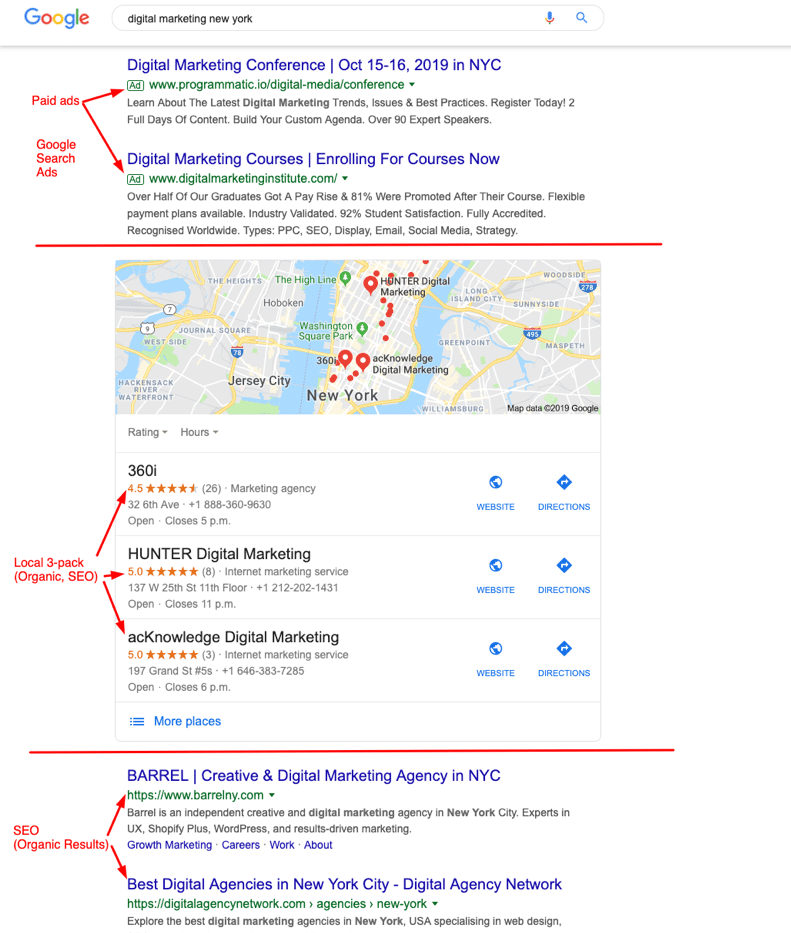
Let’s say you run a blog or an online store and invest in SEO to build long-term traffic. Once you rank high organically, those clicks are essentially free, and they keep coming without additional spending.
Yet you need to keep in mind that SEO is a slow burn – it can take months to see meaningful results.
On the other side, if you need quick traffic or want to promote a time-sensitive offer, PPC is a great option.
With PPC, you can appear at the top of search results almost instantly, driving immediate traffic to your site.
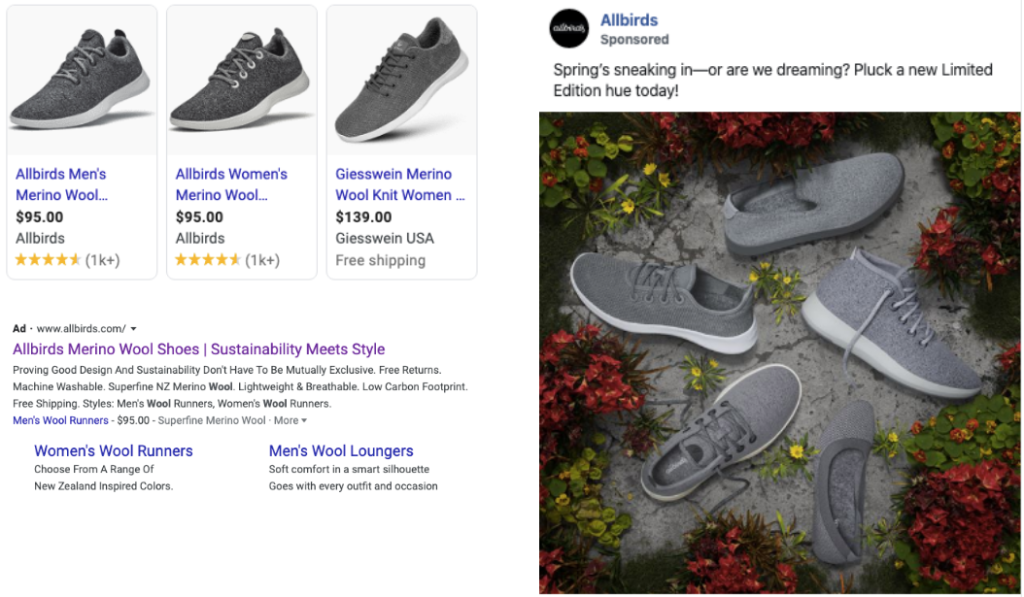
Imagine you’re an e-commerce brand like Allbirds, promoting a new collection of eco-friendly shoes. By using PPC, you can appear at the top of search results immediately, driving instant traffic to your site and boosting sales during the campaign. Sure, you pay per click, but you get fast visibility and immediate results, especially when time is of the essence.
However, PPC is pay-to-play, meaning the traffic stops once the ad spend ends. That makes it perfect for short-term campaigns or if you’re in a competitive market where waiting for organic growth just isn’t practical.
Can SEO and PPC Work Together?
Absolutely, SEO and PPC can work hand-in-hand to supercharge your online presence. When combined, they offer the best of both worlds: the long-term benefits of SEO with the instant results of PPC.
Take Allbirds case, a brand known for its eco-friendly footwear, for instance.
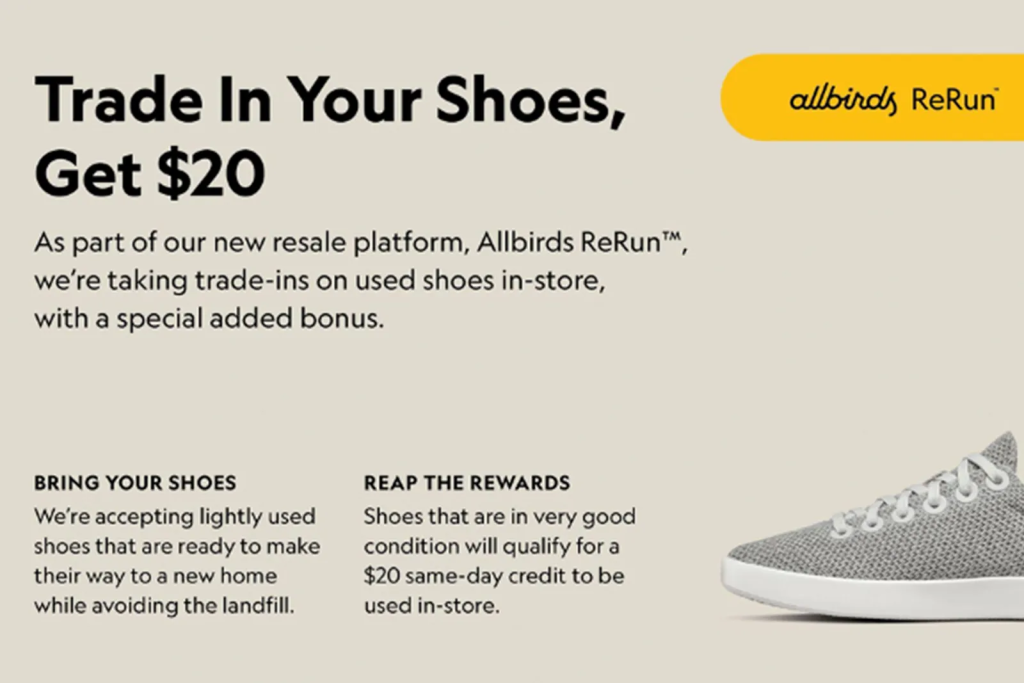
Their SEO efforts focus on ranking organically for broad, long-term keywords like “sustainable shoes” or “eco-friendly sneakers.” While SEO takes time to deliver results, once Allbirds secures a high ranking, they consistently get traffic from those searches without additional costs.
At the same time, Allbirds uses PPC to launch new product lines, like limited-edition shoes. By running targeted PPC ads for specific, high-intent keywords such as “buy eco-friendly running shoes,” their ads show up at the top of search results immediately, driving instant traffic. This PPC campaign ensures they attract shoppers looking to buy now, while their SEO strategy builds long-term visibility.
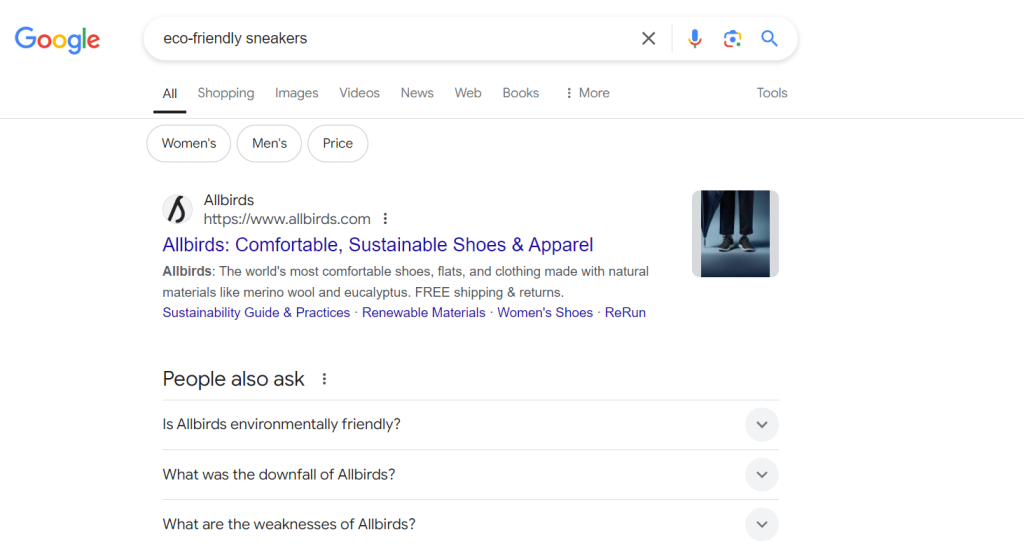
Another great advantage of combining SEO and PPC is using the data from your PPC campaigns to inform your SEO strategy. Allbirds can use the data from their PPC campaigns to refine their SEO strategy like if they notice that “best running shoes for sustainability” generates significant clicks and conversions in their paid ads, they can create content specifically optimized for that keyword on their website.
Example of Business Using SEO and PPC Ads Successfully
Whether you want to use SEO or PPC advertising, remember that the right strategies can make all the difference. Let’s explore how these three companies have used these tools to achieve remarkable success.
#1 Zocdoc: An Example of SEO Success
Zocdoc has truly mastered SEO within the healthcare sector, setting a benchmark for how to drive organic traffic effectively. By strategically optimizing their website for high-traffic keywords like “find a doctor near me” and “same-day doctor appointments,” they’ve significantly boosted their visibility online.
Can you believe that Zocdoc attracts over 6 million visitors each month, with around half of that traffic stemming from organic searches?
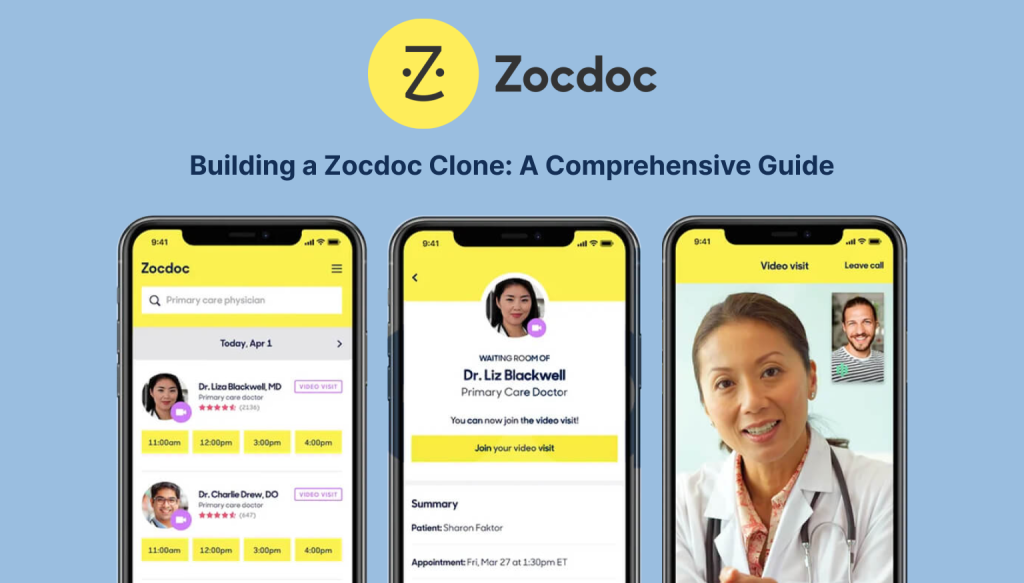
Their approach doesn’t just stop at keywords, they also enrich their site with valuable content, including blog articles and informative resources like “how to prepare for a telehealth appointment”, positioning themselves as a trusted authority in the healthcare space.
This commitment to quality content has paid off, leading to a 30% increase in appointment bookings directly linked to their organic search traffic.
#2 Home Depot: PPC Campaigns for Seasonal and Product-Focused
Now, let’s shift gears to Home Depot, where the magic of PPC comes into play.
Home Depot takes full advantage of PPC by launching highly targeted campaigns around key shopping seasons and specific product categories.
During their 2023 spring gardening campaign, Home Depot created PPC ads around the keyword “spring gardening supplies,” ensuring their ads appeared at the top of search results when people searched for seasonal products like soil, garden tools, and plants.
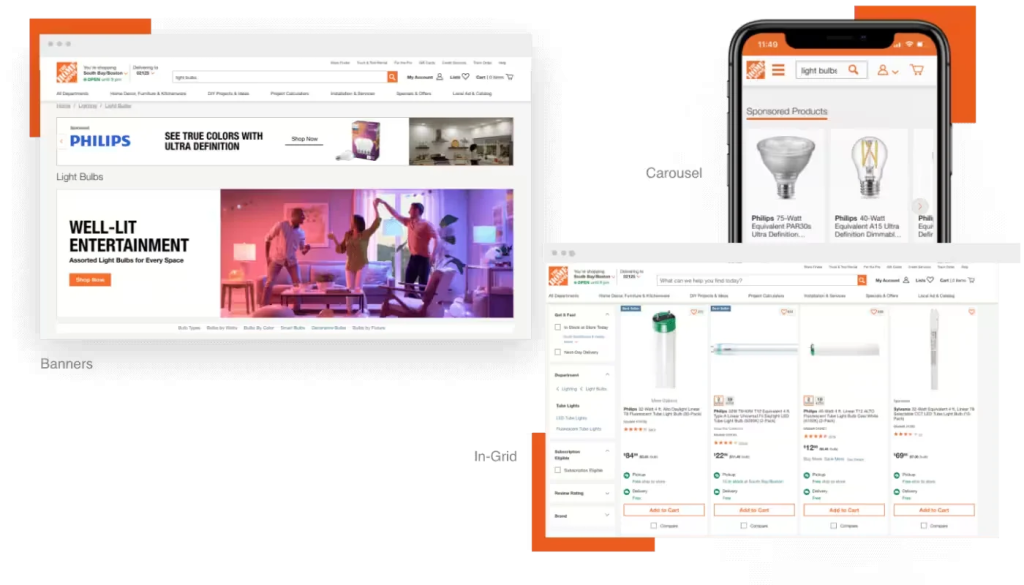
Additionally, Home Depot runs hyper-local PPC campaigns by utilizing geographic targeting in their ads, they can focus on promoting products that are most relevant to shoppers based on their local climate.
In warmer regions, the ads might highlight products for outdoor summer activities earlier in the year. By focusing on local search intent and seasonal demand, these campaigns ensure high conversion rates, especially when paired with promotions like “buy online, pick up in-store” offers.
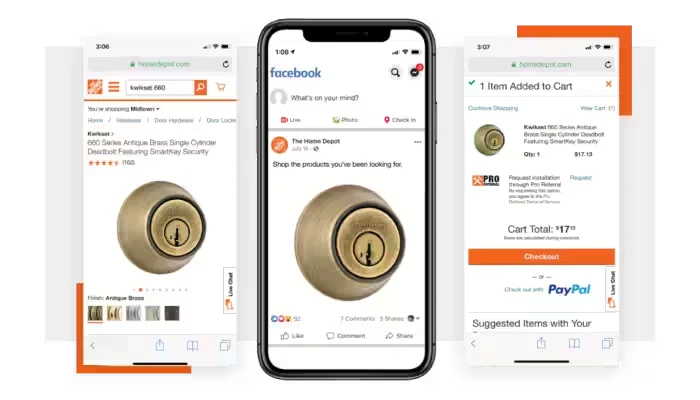
Another standout PPC strategy from Home Depot involves dynamic product ads. These ads show specific products that a user has previously viewed or added to their cart, serving as a reminder to complete their purchase. This type of retargeting boosts sales by re-engaging interested customers who may have abandoned their shopping session.
#3 Mango Languages: Winning with SEO and PPC
Finally, let’s take a look at Mango Languages, a standout in the online language-learning market. What’s fascinating about Mango is their seamless integration of both SEO and PPC strategies to maximize their online reach.
Their SEO efforts focus on high-traffic keywords like “learn Spanish online,” resulting in a 50% increase in organic traffic over the last year, which helped establish Mango as a leader in language education.
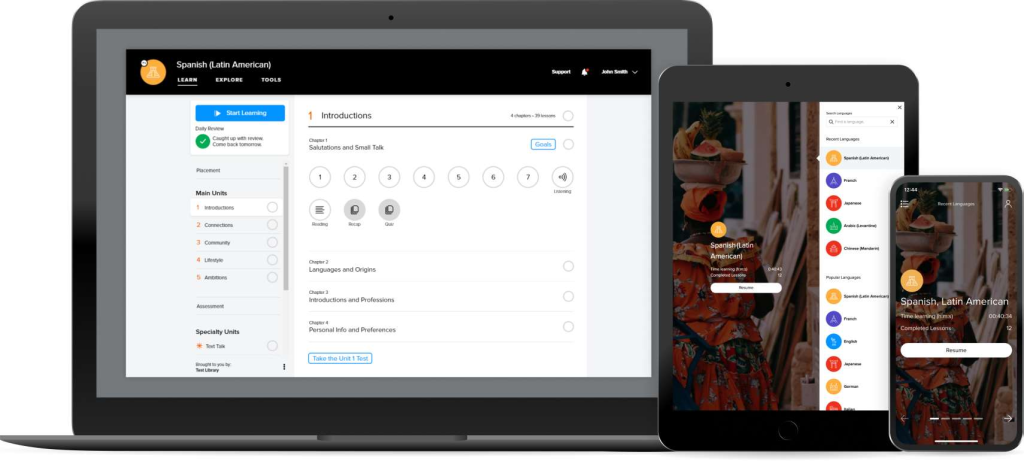
Simultaneously, Mango Languages uses PPC campaigns to promote their “free language trial” as a key selling point. These ads are tailored around phrases like “learn a new language for free,” “try Mango free for 14 days,” or “free Spanish lessons online,” directly targeting users who are searching for free or trial-based learning resources.
This type of messaging not only appeals to users looking for cost-effective language-learning options but also creates urgency and drives clicks.
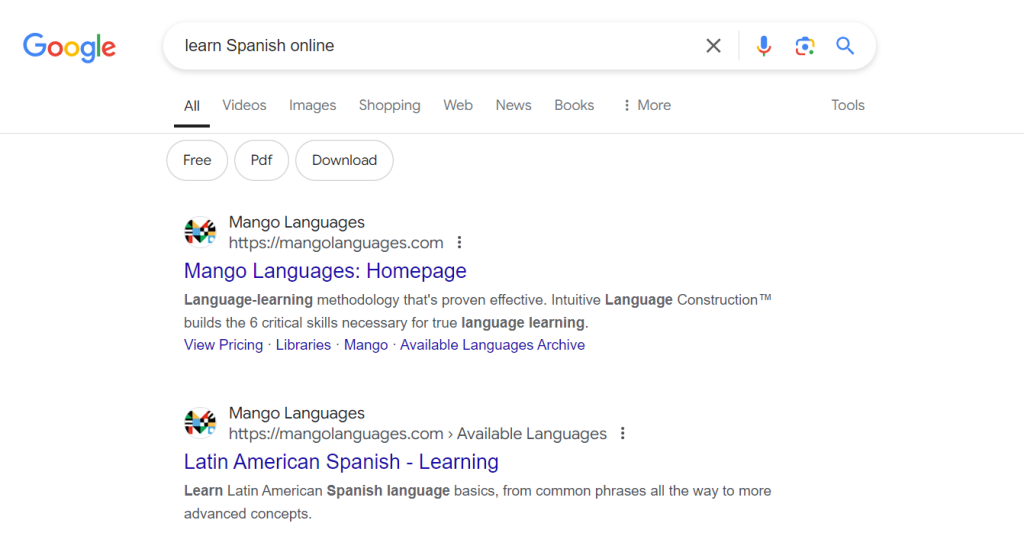
Additionally, Mango employs highly targeted PPC ads on platforms like Google Ads and Facebook, focusing on specific demographics or interests.
For instance, they run ads for “learn French” targeting college students or travelers interested in visiting French-speaking countries. They also tailor ads based on user behavior, showing personalized content to those who have previously visited their site or engaged with their content on social media.
These retargeting efforts have been particularly successful in converting leads into paying customers once they’ve completed their trial.
Conclusion
To wrap up, both SEO and PPC offer valuable benefits. By combining both strategies, you can get the best of both worlds—long-term growth with SEO and instant impact with PPC. I hope this approach can help you reach your business goals more effectively and stay ahead in the competitive digital landscape!







